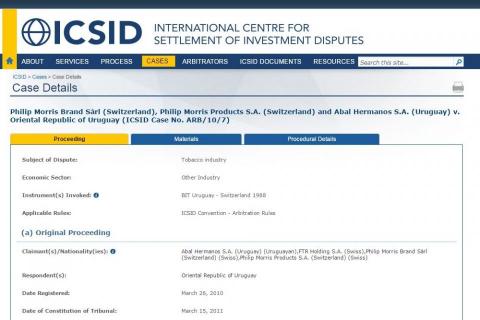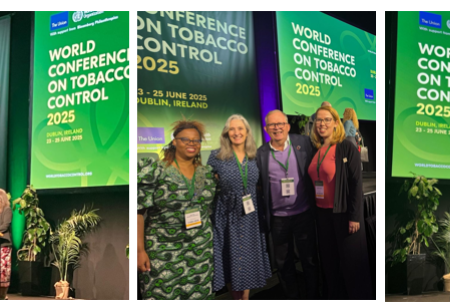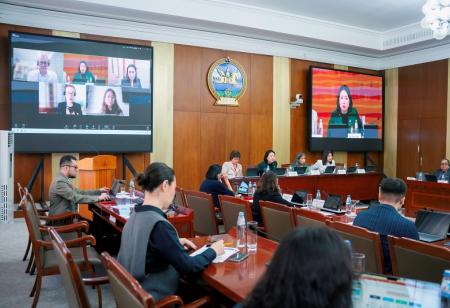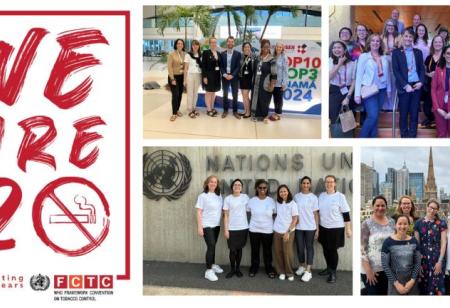
WHO FCTC implementation after Philip Morris v Uruguay: five key messages from the Award - 19 August 2016

On 8 July 2016, the arbitral tribunal constituted to hear Philip Morris’ challenge to Uruguay’s tobacco packaging and labelling measures under a 1988 bilateral investment treaty between Switzerland and Uruguay handed down its Award, dismissing all of Philip Morris’ claims against Uruguay’s large graphic health warnings and its ‘single presentation requirement’, a requirement that tobacco manufacturers produce no more than one variant of a single brand family of cigarettes. The Award strongly affirms the sovereign right of states to regulate in the public interest, including for public health. It emphasises the policy space that states have under international investment treaties, affirms that it is not the role of international tribunals to second-guess states’ regulatory decisions on complex public policy matters and makes a number of more general statements about evidence and approach that will be relevant to challenges in other fora.
We’ve written a paper outlining key aspects of the Award. Our paper summarises the procedural history of the dispute, distils the key findings of the Tribunal and reflects on its key findings and their implications for WHO FCTC implementation. It is principally intended as a tool to support and complement our capacity-building and technical support activities as a WHO Framework Convention on Tobacco Control (WHO FCTC) Knowledge Hub.
Our analysis identifies key aspects of the judgment that will be relevant to other governments looking to move ahead with WHO FCTC implementation. In particular, the Tribunal finds that:
1. Uruguay’s measures did not substantially deprive Philip Morris of its investments or frustrate any expectations relating to those investments
Philip Morris had argued that Uruguay’s measures ‘expropriated’ its investments and denied it fair and equitable treatment (among other arguments). In dismissing Philip Morris’ arguments, the Tribunal found that:
- Uruguay’s measures did not ‘substantially deprive’ Philip Morris of its investments
- Philip Morris did not have a right to use its trademarks
- Philip Morris could not legitimately expect that Uruguay would not impose stricter regulations on tobacco, nor had Uruguay made any commitments to that effect
2. States have a right to regulate in the public interest, including for public health
The Tribunal interpreted the investment law standards at stake in a way that categorically affirms states’ right to regulate, finding in particular that:
- There is a longstanding recognition of the ‘police powers’ doctrine in international law, which holds that bona fide non-discriminatory regulation for public welfare does not constitute expropriation, and the obligation not to expropriate found in the Swiss-Uruguay BIT incorporates this police powers doctrine
- The fair and equitable treatment standard does not cover measures that were ‘reasonable’ when they were adopted – a good faith measure that addresses a real public health concern and is not disproportionate will not breach the standard.
While these principles have been recognised in previous investment decisions concerning health, the Tribunal’s decision is an extremely thorough statement of how they apply to tobacco control measures that will be of much interest to other states looking to move ahead with measures implementing the WHO FCTC
3. It is not the role of investment tribunals to second-guess policy decisions, particularly where the evidence is complex or contested
The Tribunal at many points stressed the importance of deference to regulatory decisions in interpreting the scope of investment treaty standards.
It also made a number of related findings on how tribunals should assess complex public health evidence. It recognised that:
- Measures could act in combination, and therefore the impact of any one measure could be difficult to show
- States, particularly those with limited technical and financial resources, should be able to rely on evidence-based normative documents such as the WHO FCTC, rather than be required to conduct additional local studies
- Investment law does not prevent states from adopting novel measures, provided that they have some rational basis and are not discriminatory
- The reasonableness of a measure needs to be assessed at the time of making a decision – a state does not need to prove that the measure worked in hindsight
Taken together, these affirm that tribunals should not be second-guessing complex public policy decisions; and that tribunals should respect good faith and non-discriminatory sovereign regulatory judgments regarding public health.
4. The WHO FCTC and its Guidelines add legal and evidentiary weight in support of states’ tobacco control measures
The Tribunal places significant weight on the WHO FCTC and its guidelines as ‘evidence-based’ international instruments, notably doing so even though Switzerland was not a WHO FCTC party. In particular, it noted that:
- The FCTC and its guidelines were a basis for Uruguay’s measures
- The FCTC reflects Uruguay’s duty to protect public health
- The FCTC and its guidelines are a point of reference for the reasonableness of a measure
- The FCTC and its guidelines are ‘evidence-based’ and represented an ‘indispensable’ process of scientific and technical cooperation, especially for countries with limited financial and technical resources
- There was no need for Uruguay to conduct its own studies in light of the support that was ‘amply offered’ by the WHO FCTC and its guidelines
These are important findings, particularly for countries with resource limitations. The decision confirms that states are able to rely on the international consensus and evidence base that is represented by the WHO FCTC and its guidelines, including in situations where not all of its investment treaty partners may have ratified the WHO FCTC.
5. Public health is an important normative value in investment law adjudication
Finally, the Award demonstrates the many ways in which public health, as a normative value, can inform the interpretation of investment treaty standards, including in the interpretation of whether a measure is good faith, what an investor can legitimately expect a government to do, whether a measure is arbitrary, whether the police powers doctrine is applicable, and the level of deference to apply. Notably, the Tribunal placed significant weight on amicus curiae briefs by WHO/WHO FCTC and PAHO, who filed submissions in support of Uruguay, in determining whether the measures were in fact implemented for good faith public health purposes.
Download our full analysis of the Philip Morris v Uruguay award.





